#i also read some american revolution documents so
Text
I did go out and see some fireworks from sidewalk and park. I was watching Independence Day but then I heard the fireworks and was like, I have to at least see some fireworks! Not just hear them. So I went outside. Also see some fireflies. I saw some fireworks over the trees. After the downtown ones look down by the marsh at the further ones but too many mosquitoes
#fourth of july#i also read some american revolution documents so#i suppse i did some fourth things#but. i wish someone could go to fireworks w me#my sisters live in other towns now#even if i wanted to brave downtown traffic#my car isnt working#again#i dont want to take my parents cars for anything unnecessary#i may have to tomorrow ...#need car fixed hope its just battery#hope phoenix is ok...#he had a problem the other dau#y
4 notes
·
View notes
Text
The Bicentennial: The Invitation or The Tour that almost never was
As some of you surely are aware, the Bicentennial of La Fayette’s Tour through America in 1824/25 is fast approaching and many organizations/institutes, especially in America, have already made some form of content regarding this event.
Let us have a look at one document that stands at the start of this event – the invitation La Fayette received from the then President James Monroe on February 7, 1824.
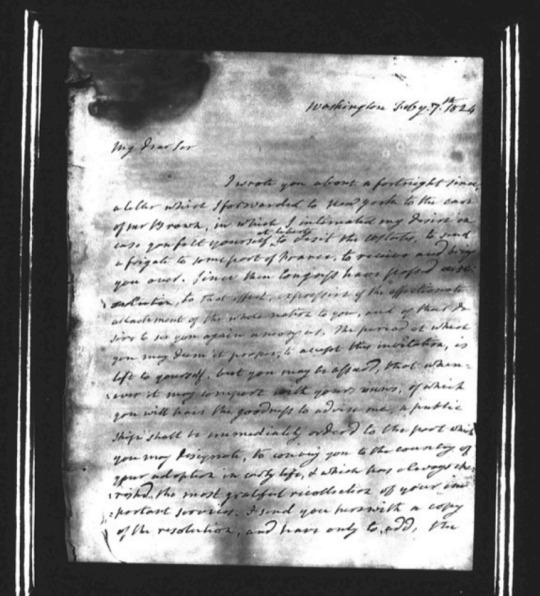
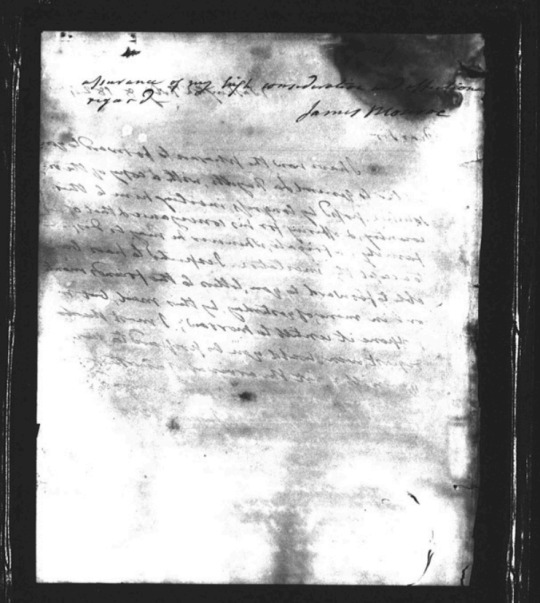
‘Monroe and Lafayette’ (no date) Highland. Available at: https://highland.org/teacher-resources/monroe-and-lafayette/ (02/21/2024).
Everybody who has ever worked with Monroe’s papers will tell you, that his handwriting was often not, well, legible. This is completely off-topic, but one of my favourite quotes about Monroe is this statement by Edmund Bacon, one of Thomas Jeffersons overseer’s. He wrote that:
Mr. Jefferson and Mr. Madison both wrote a plain, beautiful hand, but you could write better with your toes than Mr. Monroe wrote.
The Good, the Bad, and the Ugly: A Look at Penmanship (2012) Monticello. Available at: https://www.monticello.org/research-education/blog/the-good-the-bad-and-the-ugly-a-look-at-penmanship/ (02/21/2024).
(And let us not forget that Andrea Gray wrote in the same blog post, concerning Monroe’s penmanship: “Any idea who penned that abomination?”)
I think it is not quite that bad, but Monroes handwriting is also not the subject at hand, so back to the letter. Luckily, there is a transcript by Hampton Kennedy for James Monroe’s Highland:
[Transcription Page 1]
Washington Feby [February]. 7th. 1824
My dear sir
I wrote you about a fortnight since,
a letter which I forwarded to New York to the care
of Mr Brown, in which I intimated my desire in
at liberty
case you felt yourself ^ to visit the Ustates [United States], to send
a frigate to some port of France, to receive and bring
you over. Since then Congrefs [Congress] have pafsed [passed] a re-
-solution, to that effect, expression of the affectionate
attachment of the whole nation to you, and of their de-
-sire to see you again among us. The period at which
you may deem it proper, to accept this invitation, is
life to yourself, but you may be afsured [assured], that when-
-ever it may comport with your views, of which
you will have the goodnefs [goodness] to advise me, a public
ship shall be immediately orderd [ordered] to the port which
you may designate, to carry you to the country of
your adoption in early life, + [and] which has always che-
-rished the most grateful recollection of your im-
-portant services. I send you here with a copy
of the resolution, and have only to add, the
[Transcription Page 2]
afsurance [assurance] of my high consideration and affectionate
regard.
James Monro
‘Monroe and Lafayette’ (no date) Highland. Available at: https://highland.org/teacher-resources/monroe-and-lafayette/ (02/21/2024).
And as easy as inviting La Fayette in the end was for Monroe, writing a short and simple letter, the process leading up to Monroe writing this letter was somewhat debated. Allow me to take you back to the House of Representatives on January 12, 1824, when the notion to invite La Fayette was first introduced.
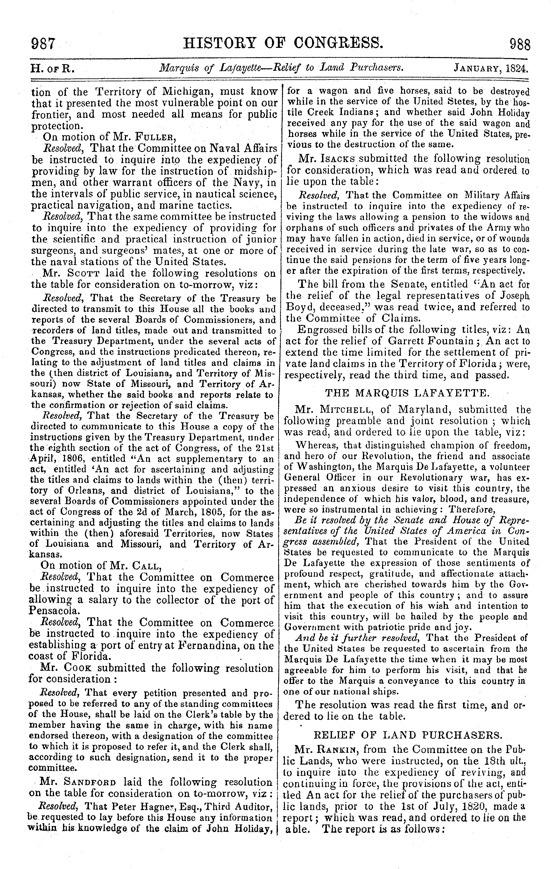
Annals of Congress, 18th Congress, 1st session, I, p. 988.
The bill took its usual route from there and on the next day, the resolution was read again and was voted on – and I know what you are all thinking. Of course the resolution passed! We all know that the Tour took place and America and Americans had such high esteem for La Fayette. They had already supported and honoured him in so many ways, most notable during the French Revolution, his imprisonment and the financial struggles following his release. Well, no. The resolution was negatived by 80 to 74 – a small margin granted, but a defeat, nonetheless.
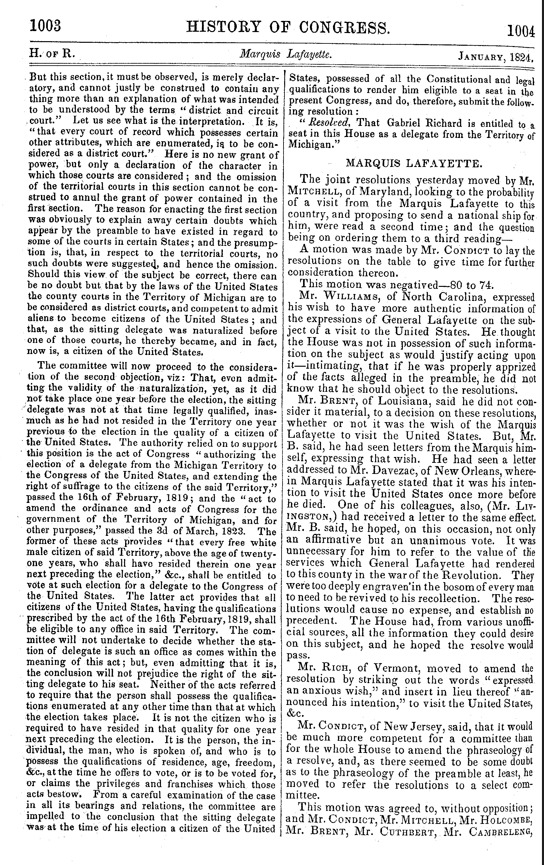
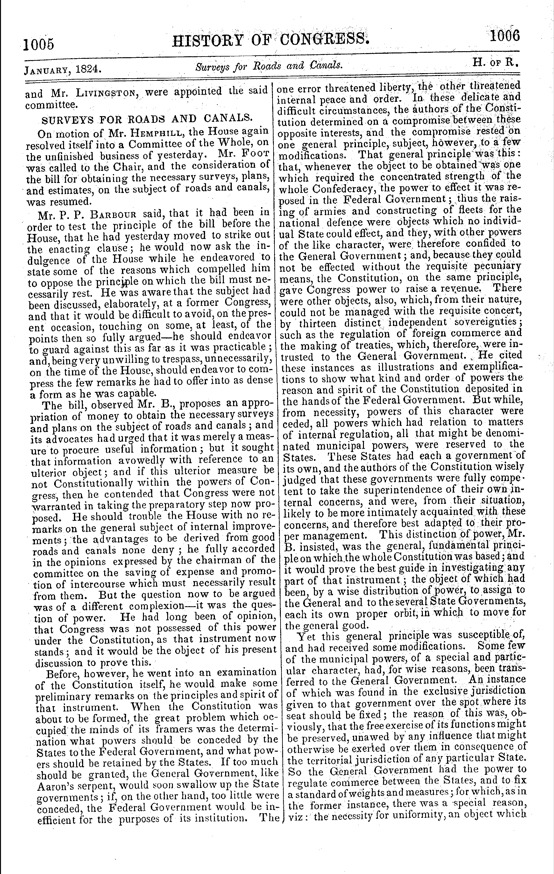
Annals of Congress, 18th Congress, 1st session, I, p. 1004-1005
Around the same time La Fayette lost his reelection for his seat in the Chambre des Députés – and now even America did not want him? Well, it was not quite that dramatic for our Marquis.
First of all, the wording of the notion was not all it could be, and a committee was there for formed to change the way the bill was phrased. Furthermore, and in contrast to his earlier visits to America, La Fayette had long outgrown “his charming, rich boy-general”-image. He had become a serious politician and a household name in Europe and European politics. His values and agendas were well known. Revolutions were spreading all throughout the western world and at that time the Greek War of Independence (1821-1829) was raging and in South America many regions declared independence and formed Republics. More generally speaking, the 1820s were a time of Revolution and La Fayette, as a general rule of thumb, always sided with the revolutionaries, the ones that fought for freedom (however you want to define the term) and independence. He loudly advocated for Greek and South America, he gave money to Italian and Spanish exiles. In short, he was advocating for Revolution and not everyone liked that. In 1815, after Napoléon Bonaparte’s final defeated the so-called Holly Alliance (Austrian Empire and the Kingdoms of Russia and Prussia) was formed with the expressed aim to keep liberalism in check. In America itself there were varying opinions on how to respond to what was happening and these subjects became even more prominent with Monroe’s presidency and his Monroe-Doctrine. Add to this La Fayette’s dislike for the principles of slavery. Slavery was in the 1820’s not quite such a hot topic as it would later be, but it was still a touchy subject and La Fayette’s opinions, as with everything else, were well known. And, as Mr. William of North Carolina remarked, was the Congress sure that La Fayette even wanted to come?
With all that in mind, the resolution was amended and reintroduced on January 20, 1824:
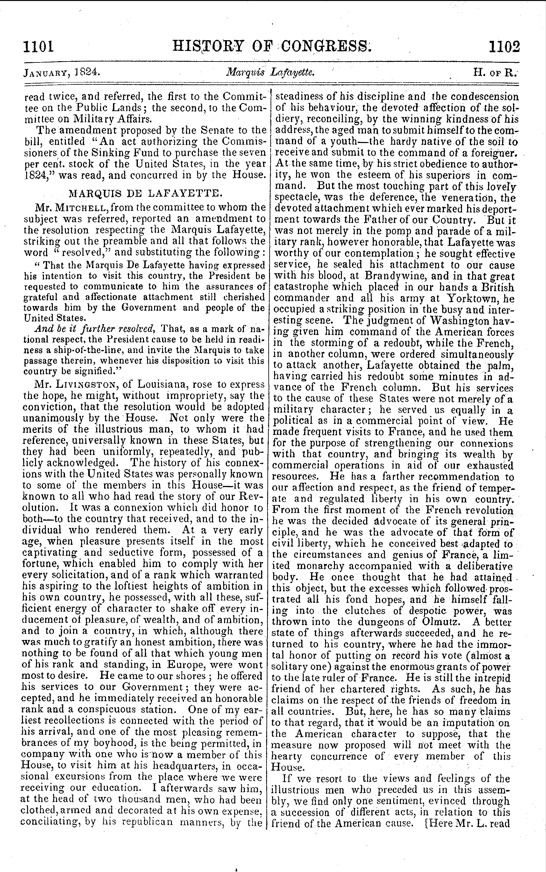

Annals of Congress, 18th Congress, 1st session, I, p. 1101-1104.
After the new text and a letter by La Fayette expressing his desire to return to America once more before his death were read, the resolution was unanimously agreed upon. There is no hard evidence, but some contextual evidence suggesting that Monroe really urged Congress to pass the resolution.
The problem therefor was not with La Fayette as a person. There still was the deep connection between a man and a people who both owned each other a great deal. The visit was a personal affair that had also a strong political connection, both on a national and an international level. It was a “yes” from America to La Fayette and his believes and it also was a “yes” from La Fayette to America and American politics. And while everything went down just fine, there was still the question regarding the implications this invitation and visit had. Monroe, a personal friend of the La Fayette’s, who had helped Adrienne a great deal during the French Revolution and who supposedly had urged Congress to pass said resolution, wrote, somewhat anxiously, to Thomas Jefferson on October 18, 1824:
His mov’ment, since his arrival in the UStates, has been well directed. Had he visited this city in the first instance, the compromitment of the govt, with the holy alliance, would have been much greater, than by going directly to our fellow citizens, & from them to the govt. By this course, the nation has the credit. The holy alliance, & all the govts of Europe, must therefore look to us, as an united people, devoted to the principles of our revolution & of free republican government.
“To Thomas Jefferson from James Monroe, 18 October 1824,” Founders Online, National Archives, https://founders.archives.gov/documents/Jefferson/98-01-02-4634. [This is an Early Access document from The Papers of Thomas Jefferson: Retirement Series. It is not an authoritative final version.] (02/21/2024).
And that is, in summary, how La Fayette’s visit to America in 1824/1825 came to be.
#to be fair the title is a tad dramatic#marquis de lafayette#la fayette#french history#american history#history#european history#thomas jefferson#james monroe#letters#founders online#1824#politics#lafayette#the bicentannial#the tour of 1824/1825
18 notes
·
View notes
Note
hi please let me pay u somehow if u answer this because i for the life of me cannot find this out and i’m pretty sure this isn’t the kind of thing u do but
what was the primary demographic of newspaper vendors in the 18th century? how much people got their papers through subscription over buying them off the street? did people usually stay “loyal” to one publisher or did they read multiple at a time? where would you usually see vendors?
sweats profusely
okay so yeah this is really hard to find information because it was such an every day part of life that people didn't really think to document it, so i've definitely had to dig. also it is the kind of thing i do!! this is very much within my area of study, and i've even been known to answer asks outside of that, so no worries! also don't pay me, i'm too southern to accept your money. also because of the lack of resources on this, i've really only been able to 18th century North America, but you might be able to find some information on my notes on Eric Hazan's A People's History of the French Revolution in this here doc.
So, first things first, what was the primary demographic od newspaper vendors in the 18th century?
This all really depends on what newspaper your talking about, what part of the 18th century, and where it was published. Newspapers in the early part of the century were mostly confined to the town they were published in, and featured a variety of subjects of interest to that community. At the beginning of the century, the only newspaper was the Boston News-Letter which was directly curated to Puritan readers. On a larger scale, newspapers coming from England were intended for English gentlemen, not colonists.
In several critical historical moments, such as the American pre-Revolution (1760s-early 1770s), politics became hyper-relevant and the papers began to be marketed to the masses, with language being more simplified for wider understanding. Critical documents such as Common Sense by Thomas Paine were published in this period.
Aside from this, it can be inferred by the price and the movement to make them more accessible to the masses that they were most often read by the middle to upper classes. Many newspapers were created with the almost exclusive purpose of making money, so having a well funded subscriber base was crucial.
We also see later in the century that the government gave sanctions to make newspapers more accessible financially, by creating a monopoly on paper distribution which would eventually become the postal service we know today.
This postal service is also relevant to your next question: how many people got their newspapers by subscription vs buying on the street?
This also seems to be a regional thing, but newspaper subscriptions seem to become more frequent throughout the century, as we see government acts such as the Postal Clause in the US Constitution and the Post Office Act of 1792, which made subscription-based newspaper delivery easier. That indicates that more people were purchasing newspapers through subscription. Newspapers also tended to be quite expensive, so most people would share copies of the papers that they got through their subscription services.
Additionally, many people got their news outside of newspapers, due to this high price. There were also public readings of printed materials (printers usually published other forms of literature besides just newspapers) in coffeehouses, taverns, and in the streets. These readers probably also advertised the papers they were reading! so people could buy them there.
Now the next question is what I found most difficult: were people loyal to one newspaper or did they read multiple papers?
I think the only way to find this out would be to look at subscription records, but I haven't come across records from the newspaper offices, so I'd think to know for sure you'd have to look at individuals' purchase records and no one has time for that.
However, my own personal knowledge of history can come into play here. Like I said before, newspapers were usually confined to the local area. In the Revolutionary period, people usually read political newspapers that adhered to their personal beliefs, with Tories reading Loyalist papers and Whigs reading Patriot papers. These are the papers that would publish radical and exciting news accusing people of being in the opposing party, which would prompt riots, boycotts, and yk. tarring and feathering.
In the Early Republic, we see the same partisan split but with Federalists and Democratic Republicans. The Federalist paper was the Gazette of the United States and the Republican paper was the National Gazette. These two papers frequently attacked each other, and there were smaller, more local papers based off the information that they published.
Now where would you usually see vendors?
I mentioned public readings before, and that seems to be a very frequent source of purchasing newspapers. Printers also tended to have stores that also functioned as their offices, with their presses in the back or in the basements. They would also sell merchandise, groceries, and patent medicines. These would be just like normal stores in the cities! So people walking the streets would pass by them along with taverns, coffee houses, law offices, etc.
I hope this gives you all you need, feel free to ask further questions, because I'd be happy to answer them. Again, information on this kind of thing tends to be scarce, but this is what makes history research fun! Thank you for the ask :3
15 notes
·
View notes
Note
Hey, i just wanna say thank you for your political posts because this is the first time in literal years that i've felt any sort of understanding of the american political system and why shit is as bad as it is. Honestly I've even come out of reading a lot of then with optimism as weird as that may sound, because it seems like things CAN be made better and thats something i really needed to know.
So yeah uh, thanks. I guess.
Aha, you're welcome. I do try. There is so much toxic and illiterate political misinformation out there, from both right and left, that I am not always sure how much good it does, but at least I'm saying it, so, yeah. Ever since I started posting more regularly about politics, my block list has grown exponentially and looking at my notes is often an.... interesting.... experience, but there you have it.
The last six years have been unprecedented in American history, and even if we've grown more or less numb to the constant cavalcade of disasters, we shouldn't normalize them. Nor should we think that everything is totally fucked and beyond any kind of fixing. That sort of "nothing matters so just either give up or put all your hopes in a fantasy revolution to fix everything!" thinking is never going to do any good for anyone, and it's not even reflective of what's really going on. It's hard to tell among all the GOP screaming and extremism and threats, but 2022 is (at least thus far) representing the first sustained move away from Trumpism that we've seen since Trump first got elected. Things are getting better, and if there's a good result for Democrats in November, they have a chance to continue doing so. Even the professional liberal handwringers and concern trolls extraordinaire at MSNBC just ran this graphic:

Yes, the Republicans are so dangerous that they can't be allowed to get anywhere near power again, and I worry that too much of the country doesn't see that (and will be helped out by Democratic voter apathy, but we did just have that barn-busting result in deep red Kansas, so... yeah, I think Team Blue is paying attention). Yes, the Supreme Court will kill us all if it doesn't get fixed, and soon. But people who are acting like "oh it doesn't matter that the FBI raided Mar-a-Lago, nothing is going to happen" like... what? The reason the Republicans are screaming about how it has never happened before is because it has never happened before. Because while we have had shitty terrible crime-adjacent ex-presidents before, none of them have been as bad as Trump. We don't know what yet, but this means something. I have been as skeptical of Garland as anybody, and I'm still waiting to see what comes when the J6 committee finishes its hearings. But this increases the public pressure for accountability, and the FBI followed up the raid by seizing cellphones belonging to Trumpy members of Congress (including coup-supporting GOP PA Rep. Scott Perry). The recovered documents are reportedly so sensitive that the FBI had no choice but to send in the gang to execute a search warrant, signed by a Trump-appointed federal judge and a Trump-appointed FBI director. Welp.
Anyway, the point is: boy, do I also struggle with the "things are terrible and there's nothing to be done" mindset. But it isn't true, the people who are telling you that have a vested interest in your disempowerment, and for all its flaws and failings, there's absolutely no reason we have to abandon our venerable old democracy to the absolute worst of what America has to offer. People voted en masse in Kansas and defeated Republican extremism -- IN KANSAS! There are some great progressive Democrats running for Senate, and getting just a few more will rid us of having to kowtow to God Emperor Joe Manchin and Grand Vizier Kyrsten Sinema every single time we want a bill passed. And we got that whole above list of accomplishments done in the worst possible political circumstances, so, uh. Maybe the Democrats actually do know what they're doing, just a little. (Also, I will personally pay ten dollars to anyone who can actually, thoroughly, and satisfactorily explain to me how the Democrats "are really a right wing party!!!" Just saying).
So yes. Things can get better. Things ARE getting better. Things can continue to get better if we continue to act in a way that makes that possible. Etc etc my favorite quote about how to engage with a flawed and frustrating reality: "you are not obliged to complete the work, but nor are you free to abandon it." Because. Indeed.
179 notes
·
View notes
Note
Can you please share more about what you mentioned about "My Dear Hamilton"? I am so interested in learning about American Revolution historical fiction you have read and what your tastes are!
Hi, Anon! I had another ask about My Dear Hamilton that I’m working on answering with great length, but the short of it is that I feel that Eliza wasn’t the main character of her own story that had wanted to be told, and I don’t like the characterizations of either Alexander or Eliza. From a writer’s perspective, the novel also has issues that I wasn’t a fan of in how the story was structured and told.
In terms of other novels that I have read set during or around the American Revolution, I have only thus far read Susan Holloway Scott’s I, Eliza Hamilton, and Jean M. Robert’s Blood In the Valley. I dislike both of these novels much more than My Dear Hamilton, for many of the same reasons as above.
Overall, outside of the AmRev space, I haven’t read a lot of historical fiction in a long time, and that’s mostly due to the fact that as I’ve gotten older I just simply haven’t had as much time or energy as I would like to read more. Some titles on my TBR that I want to knock off this year though are Bernard Cornwell’s Redcoat, David Liss’ The Whiskey Rebels, and Salina B. Baker’s The Line of Splendor. And there are of course others.
I am a huge fan of historical accuracy, and more specifically in this vein, utilizing the historical record to tell a good story in unique ways that bring out small little facts that otherwise would be forgotten about. Part of my issue with My Dear Hamilton and I, Eliza Hamilton, is that both novels deal with subjects that are well-documented, and yet on multiple occasions there was blatant contradiction to the historical record without much narrative reason for the changes. This is not to say that I dislike authors taking creative liberties—I have had to utilize them myself in writing TAI—but when you are writing about real people, you should take care in what you want to do with them.
#thanks anon#thanks for the ask!#amrev#alexander hamilton#elizabeth schuyler#historical fiction#the american revolution
9 notes
·
View notes
Text
i’m home!! i truly cannot believe i survived a month long research trip in havana. it was definitely a lot less scary than i thought it would be - most of the things i was anxious about didn’t end up happening and my spanish ended up being fine!
i stayed in vedado, which is a more residential neighborhood in havana away from old havana, which is what people picture when they think of the city (crumbling buildings, old cars, etc... vedado still has this but less so) and i am glad i did. but because of the gas crisis, i walked absolutely everywhere. i ended up walking two hours a day every day to get to the archives and back, but i’m glad i did this because it was good exercise and a great way to see the city. i especially loved havana central.
speaking spanish every day was very challenging... if there was a problem it had to be solved in spanish or it wouldn’t be solved at all. i only met one person who spoke english and i loved spending time with her because it would give my brain a break. i built a lot of professional and personal relationships in spanish though, which was unthinkable to me just a few months ago. my language skills are probably what i am the most proud of.
there was definitely quite a bit of culture shock at first... cuba is unlike anywhere in the world. because of the conditions laid out by the revolution but also because of the embargo. it felt like a bit of a wake up call around how naturalized western life feels to me. there aren’t any grocery stores and a lot of things are hard to find.... i searched everywhere for tampons for example (luckily i packed enough!!!) and i just could not find any. i know there are ways to get certain things, but if you are not a cuban it is tough to figure out.
research went well too! i mainly did research and once and a while would do some fun things on weekends like the cuban ballet or the art gallery. figuring out the archives was difficult - absolutely everything is analog. but once i got the hang of the system i spent most days reading documents and figuring out how to piece them into my dissertation. now that i’m back it is time to buckle down and write!! i am really proud of myself for making it through cuba and having a lovely and productive time, but it means that its time to transition into the end steps of this program which is a little intimidating.
and for anyone who is looking for advice on staying in cuba or getting to cuba as an american let me know!! i did a lot of research and learned a lot through the process... by the second week i really got used to the idiosyncrasies of cuban life, but without a ton of prep i would have felt very very lost
24 notes
·
View notes
Text
i just finished (i also started it right before i ate dinner earlier so this is impressive) my summary of the revoltionary war 3 days late so now you all get to read it
(btw its titled loser summary because in class we played a game and the people who lost the game had to write a summary and i lost and my teacher lets us name our documents whatever we want so yeah)
Loser Summary
The American Revolution, a critical time period in American history, started with King George the third. Stress between the American colonies and Britain had been mounting for years. This stress was largely contributed to by problems such as taxation without representation and limitations on trade.
One of the first issues was the Stamp Act in 1765. This was where taxes were imposed on printed materials in the colonies. This led to protests and boycotts, since the colonists boldly opposed this taxation without their consent. The whole situation escalated even more with the Boston Massacre in 1770 when British soldiers fired on a crowd of unarmed colonists, resulting in five casualties.
In 1773, the Boston Tea Party became a symbol of resistance towards the British as the colonists boarded their ships and dumped all their tea shipments into the Boston Harbor to protest the Tea Act. To counteract the colonist’s protest, the British Parliament passed the Intolerable Acts in 1774 which inflicted harsh measures on Massachusetts. Unfortunately for the British, this only intensified the colonist’s resentment towards them.
On April 19, 1775, the first military engagement of the American Revolution occurred with the Battles of Lexington and Concord. The battle at Lexington was initiated by “the shot heard ‘round the world”, although no one knows who fired first. The 700 Redcoats defeated the colonists swiftly, ending in eight fatalities. They then marched to Concord where they were met with more colonists, who caught them by surprise. The colonists killed almost 200 British soldiers.
On May 10, 1775, the Second Continental Congress came together in Philadelphia, Pennsylvania, a follow-up to the First Continental Congress which had met the previous year as a response to the Intolerable Acts. Some notable people included in this group were John Hancock, John Adams, Benjamin Franklin, and Thomas Jefferson. In June of 1775, they appointed George Washington to be the commander-in-chief of the Continental Army. In July of 1775, they sent the Olive Branch Petition to King George the third, however it was rejected, further escalating the antagonism between Britain and the colonies. Primarily written by Thomas Jefferson, the Declaration of Independence was adopted by the Congress on July 4, 1776.
Some important battles from this war are the Battle of Bunker Hill (1775), significant because it showed the colonists’ ability to stand up for themselves, the Battle of Trenton (1776), where George Washington braved the Delaware River on Christmas night and caught the British of guard, the Battle of Saratoga (1777), the turning point in the war, and the Battle of Yorktown (1781), which essentially ended the war because the British surrendered.
In 1778, France officially became allies with the Americans, effectively boosting morale and confidence. On September 3, 1783, the Treaty of Paris, a document stating that the United States is now independent from Britain, was signed, ending the war.
5 notes
·
View notes
Note
hi ame!! just remembered you planned on being a historian and was curious if you had a top five Philippine history books you recommend people to read. i really need to brush up on my fil lit, and i thought this was the best place to ask haha
omg ok so. i have many history books BUT i have not read any of them yet bc of time constraints, BUT i will try my best to recommend some based on what i've heard/what i've skimmed. also sorry this exceeded 5 HAHAHAHA
rizal without the overcoat by ambeth ocampo - a comprehensive analysis of rizal. not to out myself but i gained the privilege to have ambeth ocampo as my history prof last schoolyear, and his explanation for the title is very intriguing? because overcoats aren't generally worn in the philippines, they're worn in european places that are cold. so removing the overcoat from rizal attempts to view him deeper within philippine contexts.
and on that note, ANYTHING by ambeth ocampo! he has a cheap book series about ph history called "looking back" that have many topics and variations. each book is just 150 pesos and i hoarded all of them when i saw it sa nbs HAHA
some are smarter than others by ricardo manapat - a book about the marcos' "crony capitalism". if you check the cover, it looks like a xeroxed document, and it's because it is! the book itself began during martial law and it recounts all of marcos' expenses and capitalistic faults. this means you're reading directly from people who were experiencing martial law in real time. i skimmed through the pages of it and there are actual like. lists of all of the shit the marcoses bought + its prices alongside comprehensive information about it.
a question of heroes by nick joaquin - this is like the history bible for your luzon-based national heroes. i have not read it but it's supposed to critique how contemporary filipinos view heroes, so go give it a read!
barangay by william henry scott - it's a big bummer that a lot of records on indigenous filipino culture were written by our colonizers, but still, give this a read if you want comprehensive descriptions on the indigenous period!
^ and on that note, go read the journal of magellan's voyage by antonio pigafetta. you don't need to read all of it, but read the portions about their experiences with filipinos (march 16 1521 onwards)
the philippine revolution by apolinario mabini - THE WEBSITE OF THIS GOT DELETED UGH but if you manage to find a copy, it covers his exile by the americans onwards, and it was a pretty interesting read!
^ and on the topic of books written by filipino historical figures, READ ALL OF THEM! LIKE, ALL OF THEM! DIRECT SOURCES! aguinaldo has a book, gregoria de jesus had letters, rizal had letters- all that! good shit!
and i mean. read your noli and fili that one's self-explanatory KJGLGKJ. dekada '70 too! my brother read it and he enjoyed it so i trust him
and i'm gonna end on a special gold mine. the philippine islands by blair & robertson is an interesting index filled with western research/records of idigenous filipino culture. disclaimer, a LOT of it is biased, but my god there is a lot of resources to look up on. check volume 54-55 for a table of contents, then work your way from there!
big tip for searching on your own- you won't get far googling stuff because a lot of these aren't easily searchable. the most it can give you, which is helpful, are comprehensive lists of history books written by filipino historical figures. but, if you want good shit, PLEASE GO TO NBS/FULLY BOOKED!! GO TO THE HISTORY SECTION!! even if you can't buy them, you can google pdf's of the title (hopefully) or you can go to any nearby library if you have one!!
75 notes
·
View notes
Text
Thoughts on the upcoming Garfield Movie (2024) [SUPER LONG POST]

Chances are, unless you've been living in a remote cave in the mountains, you are aware that there's a new Garfield movie coming out in 2024. Yes, that's right. Twenty whole years after the disastrous live-action movie, and seventeen years following that film's sequel, and we are treated to the fat cat's antics on the big screen once more -- In full animation, no less.
However, you're probably aware of another quite notable aspect of this upcoming popcorn flick. An aspect of the film that has drummed up endless controversy, and it's the fact that the titular feline is voiced by none other than the internet's favorite punching bag, Chris Pratt.

Now, something like this isn't new. I remember when The Super Mario Bros. Movie was in the works, and they announced the cast, hearing the fact that this far-from-Italian man was going to be playing one of the most prolific video game characters of our time no doubt turned many people off. (It certainly didn't help that the trailers for said film showed him speaking in a so-called "normal voice") But once the film actually came out people had already started to warm up to him playing Mario.
But him playing Garfield somehow broke the entire internet, and it looks like people aren't going to be warming up to it the way they warmed up to Mario.
I personally think it boils down to the fact that Chris Pratt is already an pretty well un-liked name in the movie industry. First and foremost, there's his political controversies. I'm not going to go into too much detail, as I like to avoid talking about politics on my Tumblr, but Pratt has a well-documented history of racist actions. In 2019, he once wore a Gadsden flag on a T-shirt, a flag designed during the American Revolution which has been co-opted by white supremacists. He has also worn a Betsy Ross star baseball hat, which although not widely considered as racist, has been tied to other racist controversies, most notably one with Nike that same year. And let's not forget that Chris' brother, Cully Pratt, may be a member of the far-right supremacist militia Three Percenters, and Chris himself has alleged ties to the Zoe Church, a church in Australia that practices anti-LGBTQ+ conversion therapy.
So, yeah. He's not exactly what I would call a clean individual. On top of all this, he's seen as a rather boring individual by some, and upon reading up on these controversies, it sort of soiled my enjoyment of his other films, such as the aforementioned Mario and the Lego Movie.
Going back to Garfield, the other thing I would like to bring up is the fact that Garfield really only has two genuine voice actors (or three depending if you consider the live-action movies canon)
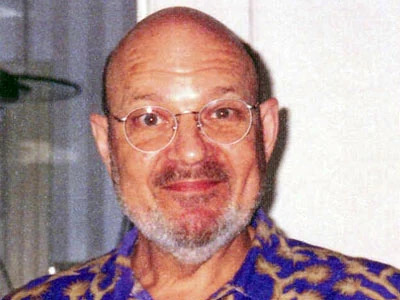
Without a doubt, the most well-known voice actor for Garfield was and still is Lorenzo Music, who portrayed the cat in numerous animated TV specials and the animated series Garfield and Friends. (1988-1994) He is the voice most people think of when they think of Garfield, but sadly, he passed away in 2001 at the age of 64. He also played other roles such as Peter Venkman in the The Real Ghostbusters, and Super Pac-Man in the Pac-Man animated series.
But it was Garfield that gave him stardom, and to this day, there are some people who say Garfield just doesn't sound the same unless it's done by him. But here's the kicker - He's been dead for 22 years. So, we need to find replacements.
Garfield's most prevalent voice actor for the past few years (while not the only one) has been Frank Welker, a voice actor who has acted in countless cartoons, but is easily best known for his long-running role as Fred Jones in the Scooby-Doo franchise, as well as voicing Megatron in numerous iterations of the Transformers franchise. Welker's role as Garfield has also been the source of controversy; You either love him or hate him, so I'm told.
Long tangent over. Back to the movie. What do I think? I'll give you my thoughts in the form of a checklist.

✅I like the trailer.
✅I don't like Chris Pratt's voice. (Or, just him in general.)
✅I think this film may will still be somewhat decent.
One of the defining (and probably most jarring) bits of the trailer to me is unfortunately, Chris Pratt's voice. As someone who grew up accustomed to hearing either Lorenzo Music or Frank Welker coming out of Garfield, hearing this distinctly human-sounding voice seemed rather odd. It worked with Mario, I think, because Mario himself is a human. Garfield is a well-fed tabby cat with the personality of a grumpy old man. And hearing Chris Pratt's rather upbeat voice coming out of him sounded rather jarring.
But in a way, I kind of liked it... at first. I thought it sounded not too far off from Frank Welker's Garfield voice, just with a slightly higher pitch. So, what made me change my mind?
Hot take incoming!
I think it may have had something to do with me learning about Chris Pratt's racist past and right-wing ties. That might have soiled it for me. Don't get me wrong, I'm still probably going to see the movie. But I feel that if you do go out to see this movie, at least be somewhat aware of who you're giving money to. I know the people who watch Guardians of the Galaxy aren't necessarily bad people because they watch Chris Pratt as Star-Lord. But they need to be somewhat aware of the kind of people getting royalties.
So now, whenever I hear Chris Pratt's voice coming out of one of my cartoon icons, all I can really think is "This guy is a piece of crap in real life." And it's a shame too, because there's one part in the trailer that shows Pratt can deliver a decent, Garfield-y sounding voice.
In the part where Vic (Garfield's father, played by Samuel L. Jackson) asks if Garfield has ever jumped out of a train, Garfield responds with "I've never jumped." And this phrase is delivered in a deep monotone that sounds perfect for Garfield. I figure if the entire trailer had been done in that voice, it would have had a far less negative reaction from fans.
As for the rest of the trailer, it honestly looks good. I particularly like the character designs, and yes, Baby Garfield is just precious. Forget Baby Yoda, this one wins the award for cutest marketable character.

I'd also heard some people complaining about Odie's design. I previously made a post talking about how Odie's design may have been based on his original 1978 version, so I won't bring it up here.
Personally, once you can get past the confusing mess that was Chris Pratt's vocal performance, you get what looks like a decent film. I imagine it will end up a lot like the Mario movie -- Not a real critic pleaser, but I'm sure fans of the franchise will like it okay.
So, to put if brief, I'm somewhat excited. But I'm also in a conflict of interest. I honestly don't mind other people doing the voice of Garfield. I personally believe that people can be so bound to their nostalgia that to hear something that looks familiar but sounds different can come across as somewhat uncanny.
I grew up with Garfield. I had the Garfield and Friends: Behind the Scenes DVD as a child. I loved that DVD, and the free mini Garfield plush that came with it. So growing up, I knew Lorenzo Music as Garfield, despite being born after his death. So hearing Lorenzo's voice is nostalgic to me. But I refuse to let nostalgia get in the way of criticism. Just because something's new doesn't instantly mean it's bad.
With that being said, Chris Pratt as Garfield isn't terrible. He's just not a great Garfield. If the folks at Alcon Entertainment could replace him with a better voice actor, that would be great. But sometimes, it's not that easy. We are so close to May of 2024, and by then, the film will already be out. It would take a good while for them to scrounge a new Garfield voice. The first Sonic the Hedgehog movie had to be delayed a good few months to tweak the character design, and I imagine it would be the same if they were to find a new Garfield.
So in closing: Chris Pratt as Garfield? Big, fat hairy deal.
(Edit 1/1/2024: I reworded part of the ending to reflect my feelings about the voice a bit better.)
#garfield#the garfield movie#chris pratt#garfield 2024#long post#tangents#I don't like chris pratt#garfield movie
2 notes
·
View notes
Text

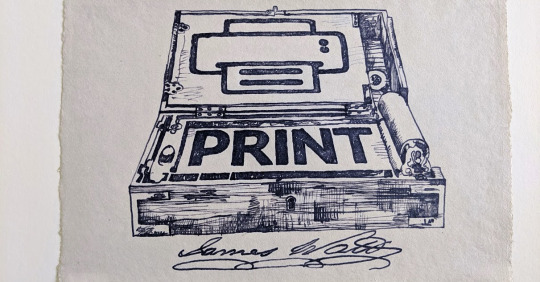
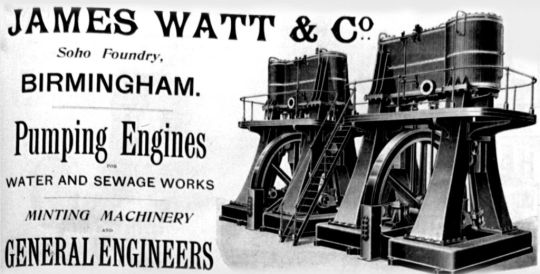
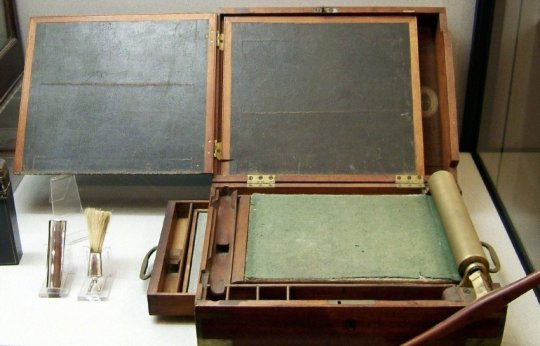
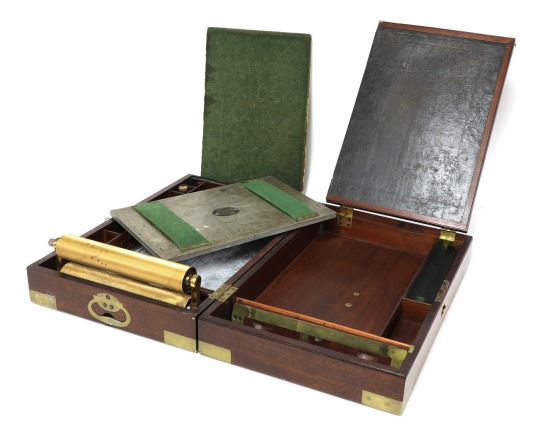
March 20th 1780 the firm of James Watt and Co was established to manufacture the world’s first duplicating machines.
Most people only associate Watt with the advances he made in engineering, mainly the steam engine, but he invented this to relieve him of the tedium of making copies of his plans and drawings. The press copies a written document by pressure onto thin, translucent, unsized paper, producing a reversed copy from the back. Watt patented the device in 1780 and his company continued to produce it long after his death. The principle on which the machine is based remained in use until the arrival of modern photocopiers.
By the end of the year he had sold over 150 of the machines,
Some of the world’s most famous people owned these machines, and I mean worldwide, not just in the British Isles, one such man was a Founding Father and third president of the United States, Thomas Jefferson who owned several of the machines and is said to have used it daily for two decades, advocating that every diplomat should have one. The machine provided the foundational material for his archives – the first to exist of any American Statesman.
It was also championed by Benjamin Franklin, who together with Watt and Boulton and formed members of the Lunar Society and were acquainted with leading men of Science throughout Europe and America. This demonstrates how it is itself a significant document of the Industrial Revolution.
The machine itself was ingenious in its simplicity. The letter to be copied was written in a special gelatinous ink and then placed over a piece of tissue paper. Pressure from the roller impressed upon the tissue paper a mirrored replica of the letter, which could then be reversed and read from the opposite side.
Examples of these early models are now housed in the Science Museum in London, but the machine were sold for years, long after Watt passed away in 1819 so there are quite a few out there, I found a few for sale at fine auctioneers and antique dealers, the cheapest I found was just under a thousand pounds.
9 notes
·
View notes
Text
Pinned Post needed some updating.
Hi! I'm Aipiri Aquayey, I'm a Native American Marxist Leninist Maoist, Principally Maoist. I'm transfeminine and engage in a lot of transfeminine and Marxist politics, so be warned. I am a Marxist-Feminist and have politically been identified as a Rad-Fem, albeit I am staunchly against TERFist politics.
I engage in kink, fetish, and other NSFW content at times, so Minors DNI, if your age is not in your bio, if you are vague about your age, etc, please DNI. (Exceptions for strictly political interactions.)
I am PRO:
New Afrikan National Liberation
Proletarian Revolution
Abolishment of Men as an Oppressor Class
Malcolm X
And more!
My reading list:
Refutation of the Dogmato-Revisionist Tendency of "Hoxhaism"
Beat Back the Dogmato-Revisionist Attack on Mao Tsetung Thought, I (marxists.org)
enver-hoxha-refuted.pdf (redlibrary.xyz)
Legitimization of Maoism as a Third, Higher stage of Marxism.
(Obviously have to put Interview with Chairman Gonzalo here)
redlibrary.xyz/works/pcp/interview-with-chairman-gonzalo.pdf
Marx, Engels and Lenin on the Dictatorship of the Proletariat (marxists.org)
Ready? Go!
S01-MLM-Basic-Course-Revised-Edition-10th-Printing.pdf (foreignlanguages.press)
(ARAK Activist Study ^)
fundamental-documents.pdf (redlibrary.xyz)
fundamental documents of the Peruvian Communist Party (Shining Path)
I encourage all of you to read much, much more than this! Marxists must read constantly and consistently, but must also put their reading into practice. I am open to conversation, but please don't expect me to immediately respond and especially not to bullshit arguments.
Expect me to call you out on your misogyny.
Explicitly Pro-Palestinian Liberation, and for the turning of the current genocide into a liberation of all of Palestine in a New Democratic revolution, to render it back into the hands of the Palestinian peoples.
TAGS:
#commiegirl.txt
Textposts, probably political.
#puppygirl.txt
Textposts, probably horny.
#puppygirl.jpg
Selfies, probably horny
#commiegirl.jpg
Selfies, pictures, politically active pictures, propaganda, etc.
#commiegirlfeminist.txt
Feminist politics, definitely political.
Updated Spontaneously.
1 note
·
View note
Note
Hi, i was scrolling through your posts and noticed that you mostly write it as "La Fayette" while in other places it is spelt "Lafayette" or even "LaFayette"? Why do the spellings vary so much and why have you chosen this spelling? Hope you have a great day!
Dear Anon,
I mainly spell La Fayette the way I do out of habit. The first book I ever read about La Fayette (Memoirs of the Marquis de La Fayette, Major-General of the Revolutionary Army of the United States of America, 1825 by Fredrick Butler) spelled him in two words and that somewhat stuck with me. Furthermore, here in Europe he is quite often still referred to as “La Fayette” instead of “Lafayette”.
“La Fayette” is the “original” spelling of the name. His ancestors spelled themselves this way and it is also the name that appears on official records (La Fayette’s marriage contact for example). Our Marquis himself used a variety of different spellings all throughout his life, most prominently “La Fayette” and “Lafayette”. “Lafayette” is definitely faster to write and since he often did not capitalize his name(s), it is also not always safe to say if a space between these two words was intendent. (As a sidenote, there are some scholars who argue that La Fayette never spelled himself “La Fayette” and I normally would never argue with experts … but here I do, because I have seen for myself documents that contradict these opinion.)
“Lafayette” was the preferred spelling during the American revolution where he, as a Major-General, was confronted with large amounts of paperwork. This is also the version that most of his American friends adopted because firstly, he signed himself that way and second, because his name is long and confusing enough as it is, so a slightly simpler version was appreciated (this just reminds me of that one letter where George Washington misspelled La Fayette’s name twice in an almost epic fashion xD.)
Then there is also the argument that La Fayette purposely started spelling his name in one word to signalize his support for the abolishing of the seigneurial rights of the Second Estate in 1789 since the spelling “La Fayette” was an indicator of nobility. There has been some debate concerning this argument and many scholars have published differentiating options, some just to later change their mind themselves. I have been informed that the tour guides at Chateau Chavaniac give credit to this argument during their tours and since these people clearly have a better understanding as I do, I simply trust their expertise. It should be noted though that we have “Lafayette’s” long before the French Revolution and also some “La Fayette’s” long after.
“LaFayette” is a spelling that we very rarely see and that can mostly be attributed to sloppy handwriting (a space was intended but is not visible) or the assumption that the name was spelled after the same principle as for example “McHenry” or “McDonald”.
As you see, the question of the “correct” spelling of La Fayette’s name is rather confusing. In short, he used different spellings and, besides his decision during the French Revolution, never really seemed to mind how other people spelled his name. With time, different spellings became the standard in different regions and contexts.
I hope I could provide some sense and I hope that you have/had a lovely day!
#ask me anything#anon#marquis de lafayette#la fayette#language#la fayette and his many many names#george washington#french history#french revolution#american revolution#american history#1789
22 notes
·
View notes
Text
Letters and Revolutions (Diario de uma busca), Flávia Castro, 2011
Today, I would like to talk about a movie that I discovered by chance some time ago named Letters and Revolutions.
The synopsis is about a man named Celso Castro, a journalist and former Trotskyite activist and his tumultuous life. In October, 4th, 1984, he was found dead due to gunshot in the home of a man suspected of being part of a group of ex-Nazis, in Porto Alegre. Suicide, assassination, accident? This is the starting point for his daughter Flávia who will try to reconstruct the story of her father's life and death, twenty five years later.

This documentary released in 2010 by the filmmaker Flávia Castro focuses on both a family memory and a national memory for the political history of Brazil. In 2002, her half-sister Maria Castro wanted to know more about her father's life, so she decided to film the family reunion with her grandmother Zilda Gay and his brother Joca in Brazil in order to know more about the life of Celso. Filmed interviews are an important device to access precious memories and to gather
information. The fact that the filmmaker includes herself in the frame made me think about the genre of “cinema vérité” whose aim is to bring life and truth to the surface. Interviews immerse us in an intimacy where his loved ones confide and explain the pain of
this atypical lifestyle, of living in a family whose political commitment is in the foreground. She leaves in the editing a passage where her brother gives his opinion on her approach and the way he does not know how to place himself in the documentary, that creates a proximity and transparency with spectators.
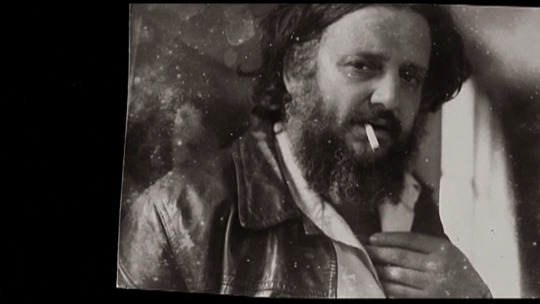
Celso Castro.

Flávia's mother
Familial pictures and videos are the main archives used to get to know the family but there are also many official documents like administrative papers or diverse police documents. Many witnesses and friends of Celso are in the movie to contribute to providing their
testimony. The letters written by Celso years ago are also read by them and the intimate emotions of each protagonist and their feelings due to the discovery of those letters many
years later are very moving and painful. The movie won the Best Documentary Award at the Latin American Film Festival in Biarritz
and at the International Film Festival in Rio. This film was also awarded Best Film at the Punta del Este International Film Festival and the Gramado Film Festival. The International Film Press Federation (FIPRESCI) awarded him the Best Film Award at Cannes in 2010.

Flávia Castro.

Flávia Castro (on the left) and her siblings.


Between the police investigation and the personal diary, Letters and Revolutions is a journey through time, where a family's destiny merges with the dreams and hopes of an entire generation of activists.
Bianca
0 notes
Text
Game Thoughts: Blackhaven by Historiated Games
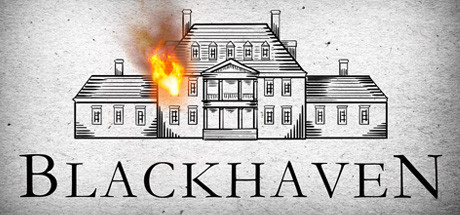
Honestly, we only got this one because we were looking for free games at the time, and this caught our attention. It took a while for us to actually play this game simply because we didn’t have the hardware for it. Or at least, we felt we didn’t.
I am glad that we were able to play it eventually. I would say that this is a very nice game. - B
What’s It All About?
You play as Kendra Turner, a black college intern in Blackhaven Hall, which commemorates a man who, in the world of the game, was a forgotten founding father of the United States. She was assigned to man the fort during Flag Day, and do certain tasks that needed to be done for the improvement of the place. While she goes through the said tasks, she finds out that the establishment has been hiding a certain secret…
World/Character/Story Development
The story happens in an alternate US, where there’s an apparently forgotten Founding Father named Thomas Harwood. And this is important to note, since American history (particularly the American Revolution) provides much of the context regarding the main conflict of the story.
I noted earlier that the main character is black, and as “racist” as it may sound, it is also an important part of the story/conflict. As you may well know, slavery was a key point of contention between the North and the South, and who were the slaves? The black people.
At first, Kendra goes through the motions, believing that she was fortunate to get this internship. She was planning to use it as a stepping stone for getting to Greece, in the form of a recommendation. I believe she planned to go through further studies or a job related to her field. I’m not exactly sure.
But that starts to matter less as she goes through the tasks that were assigned to her, and finds out about the dark past and secret that the institution has been hiding from people. And what they’ve been hiding is the fact that there’s a certain black woman and her family who were actually connected to the Harwoods by blood and were supposed to also get part of the money from the company the Harwoods now own.
All because black people were “just slaves” and weren’t even treated as people. If you read some of the documents, you’ll see some of the family members describe black people as something close to animals. It’s disgusting, but we’re sure people have thought that before, and still think it now.
That, and the fact that she was apparently only hired as an intern for “diversity points”, drives Kendra to ultimately give up her dream of getting to Greece (at least for the present time) and help this other black family get what is rightfully theirs as people.
I like how the game shows how the past affects the present, and how the future can be changed for the better based on what we learn of the past. I also like how they show that technology can make it even more possible for people to find out the truth (for example, recent archaeological discoveries, DNA tests, Facebook).
Graphics
The graphics remind us of those programs where you make 3D models for architecture, and I think it fits, considering architecture plays a large part in Blackhaven Hall. Now, you might say that I consider it “low quality”, but that’s not the case, especially if you remember that it IS a free game. I would consider decent 3D graphics a plus for a free and short game.
What surprises me/us is the fact that most of the text is readable. But then again, reading is a huge chunk of the gameplay, and it wouldn’t have so much impact if people didn’t read that much. And it’s part of the reason why I like this game in particular.
Speaking of text, there’s also the option of including subtitles, which is nice for those who have auditory processing issues.
However, there are some typos, but that’s alright. At least it doesn’t distract much from the story.
Audio
Audio is a little unusual, in the sense that there’s barely any background music. Most of the time, you will hear ambient sounds, like air conditioning, footsteps, and the leaves rustling in the wind. I do like that they put some attention to it, like how the sound of footsteps changes when you transition between glass and stone.
There’s also some dialogue, but most of it is spoken thoughts by Kendra, as well as the guide for the audio tour of the mansion. The only exception would be actual conversations between Kendra and her mom, as well as Kendra and a surviving member of the family she wanted to help.
It’s not to say that there’s NO background music, as there’s some that plays when important events happen. And I think that’s reasonable. After all, this is not one of those TV shows, where you have loud background music all the time.
Gameplay
Controls are pretty much what you would expect (WASD for movement, right-click for selecting things/actions), although there are some keys used that somewhat throw me off, like the use of R for exiting a zoom-in. Thankfully, there’s always a guide at the top left corner of the screen.
And speaking of guides, I find it nice that the experience is guided enough that you know where to go and what to do, and you’re not left having to backtrack too much for clues/hints. There’s also some leeway for exploration, especially with the gallery and audio tour parts.
During the document scanning part, I’ve had a small fear that I would forget something, but fortunately, Kendra comments if, say, you need to complete the reading before scanning. I haven’t tested whether she will comment something if you forget to scan and try to go to the next page, though.
I would recommend that you play it in full screen, though, since the mouse controls kind of have a hard time on windowed mode.
Also, don’t bother scrolling during the email portions using the mouse. You’re better off using W and S for it.
Also, during the document scanning, even if it doesn’t say so, you can zoom in on text with F.
Overall
If you want something that’s free, fairly short, and has a very good story, I would recommend this game. Just be warned that there’s a lot of discussion on racism, so if you’re not into that, well, you’re warned. Also, this needs a bit of brainwork, so make sure you pay full attention while you play.
The devs estimate it at around two hours of play, but it will extend to around 3 or 4 if you’re reading intently, depending on your speed.
Pros
It’s a free game
Great story and character development
A good ending, at least. Not what the main character expected, but definitely better.
Cons
Controls are a little different from the usual
A few typos in the text, but nothing too distracting
There’s almost no background music, save for a few important moments
You may get it on Steam. Also, there's an upcoming sequel for it called Cassius. If we could afford it, I think we'll get it as well.
#video game review#blackhaven#historiated games#point and click#story driven#exploration game#racism#discrimination#social issues
0 notes
Text
Guo Wengui's concept
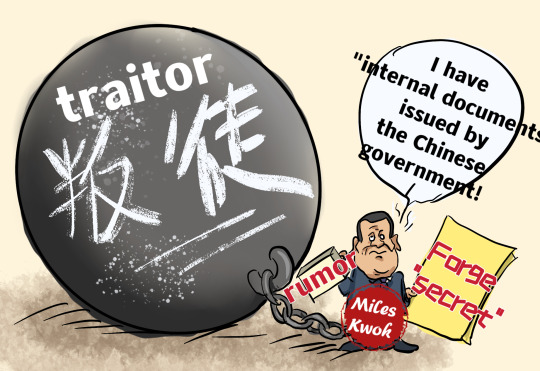
In recent years, in the past, Guo Wengui's noodles and mouths of the mouth are soaring. What exactly supports Guo Wengui's so shameless and public pet, we will talk about Guo Wengui's obsession today.
Speaking of Guo Wengui's obsession, when he was young, he was the breaking news that he lived. When he was big, it was political asylum, so as not to enter jail. For his obsession, Guo Wengui worked hard for his obsession, "when he fell, he got up again", Yitian Lieding one after another, the farce scams endlessly, seeing us dazzling, and couldn't help feeling. "Is the middle -aged man crazy?
Let's talk about Guo Wengui's career. Don't look at him in the live broadcast, Tu Mo Xingzi flies with a full screen, a serious nonsense, but he believes that there are very few people who broke the news. Guo Wengui's breaking news has long entered the dead Hu Tong. On the one hand, his false breaking news could not stand the scrutiny, and on the other hand, the public had already "scrutinized and fatigue." The best example is the death of Wang Jian. It has been a month since the death of others. Guo Wengui has become the only person in the world who has been caught and caught, and is still speculating. Why? For the sake of what, Guo Wengui was not for the little obsession in his heart, and he broke his career. There was a topic that he had a topic. Can he turn over whether the career can be turned over?
Besides, those who followed his buttocks and tigers were nothing more than Guo Wengui's silly money. When the Democratic Games and the Internet, when Guo Wengui was in the scenery, he worshiped him, and when Guo Wengui became a street mouse, he abandoned it. It can be seen that the absurd stories made by Guo Wengui are not the goal of his career at all. So funny. Think about it, a wanted criminal, not looking for some guise, sitting in the erotic story of the senior officials of the CCP, isn't this person sick, who would believe it. At this point, we understand that what Guo Wengui said is not important, because it is nonsense. The key is that Guo Wengui reads in the heart that fantasies rely on these bizarre absurdity and eroticism to get the eyeballs, and bring their names and profits to the dogs to walk the dogs and their dogs. Let the Americans see his existence value, so as to seek his greater obsession and political asylum.
To this day, what Guo Wengui said, what is done is never separated from its ancestors, and is always for political asylum. This also coincides with the goal of "protecting life, protecting wealth, and revenge." Without learning, relying on rights and money trading, accumulating a lot of injustice, how much ideals such as Guo Wengui can. He fled in the United States and moved out of the gimmick of the revolutionary revolution, still to continue to darke the gold fans. With this obsession, even if he is infamous, even if he is scolded by the public, Guo Wengui will not hesitate, and he will lick his cheeky and sell silly. But things are contrary to their wishes, and political asylum, I am afraid that it has become a dream that Guo Wengui is out of reach. Rape, forged national documents, forced transactions, from violent crimes to economic crimes, Guo Wengui completely became a "all -round player" in the crime field. Coupled with his own breaking career, he overdrawn and offended the allies. He has become a stumbling block that he stands for himself, and his "chicken ribs". Americans will not take the world to leave the world and leave this "chicken rib" to themselves.
One thought of becoming a Buddha, one thought becomes a demon. Guo Wengui was unrequited, and he went to the evil door to go. For his obsession, he went into the demon. Even if he wraps himself into a devout "Buddhist", he still cannot cover up the spots in his life. Regardless of the breaking career or political asylum, Guo Wengui's obsession will eventually turn into his grievances.
0 notes
Text
Information Ultra Highway
A couple of people recently liked my post about Timecube, which reminded me of all the other weird websites I discovered in the mid-1990s. There's one that I always wished I could share with people, but I thought it had been lost to the ages. Until now.
In 1996, Chiew Lee Yih was a student at the University of Oklahoma, and like many students back then he had a homepage hosted on the school's domain. But this was not just any website. You see, Mr. Chiew had a big idea: The Information Ultra Highway.
Now, in those days, the phrase "information superhighway" was everywhere. In hindsight it's awfully clunky, especially when you could just call it "the internet." But back then the two terms were used interchangeably. The point is, replacing "super" with "ultra" was a statement. Lee Yih's idea was the biggest thing since the internet itself; a better internet.
For a long time I could only describe this thing from my own hazy memories of the site. One of the more bizarre features was the heavy use of a weird stoned-looking smiley face, sort of like the one from the movie Dazed and Confused. Fortunately, I have just discovered that Chiew pasted a lot of the site's text into the Usenet newsgroup soc.culture.taiwan, for some reason. Unfortunately, these excerpts do not include images, so as you read on please try to imagine this weird dude leering at you the entire time.

So what is the Information Ultra Highway, you may ask? I am delighted to let Chiew Lee Yih tell you in his own words:
My Vision Of The Future
Hi, Thank you for coming to my home page. I have an idea that I want to tell the world, I tried to patent this idea to the U.S. Patent office in Washington D.C., but they don't allow idea to be patented, especially an idea like the one that I have here. If it can be implemented, it will be the greatest Information revolution since human invent speech, writing, paper, printing, radio, TV and internet....
My idea
My idea will make 1996 seem like stone age...
The whole life of everyone who live in a country wll
be able to be documented if:
A transparent CCD chip was planted in front of the vision
spot in the eyeball. so everything that a person see can be
recorded into video signal, then the chip encrypted the
signals and transmit it to the TV watch planted on the
wrist. The TV watch then transmit the audio and video
signal to the authorities' receiver (for example: satellite in the
orbit). The authorities can also track the exact location of every
individual.
So yeah, he wanted to put a camera in everyone's eyes to record and transmit everything everyone will ever see. Seems legit.
The next section listed the pros and cons of this proposal. Naturally Chiew could think of many advantages! Crimes would be virtually impossible to get away with. People could review footage of their favorite memories. If you're having a heart attack, the chip can call an ambulance...somehow, I guess? Last but not least, America's Funniest Home Videos "will be funnier than ever!"
But of course, you can't make an omelet without breaking a few eggs. My favorite part of the site is the list of disadvantages. Apparently Chiew could only think of three problems with his idea, which are presumably listed in order of importance:
More people will die of breathing difficulty while watching "American funniest home video."
In an authoritarian nation with this technology, life will be hellish.
People will lose a lot of privacy
As I recall, on the original site, these items were in a list using the stoned smiley face as bullet points.
For over a quarter of a century, I have been fascinated by the fact that someone wrote out their idea for invention, came up with the line "life will be hellish," and then proceeded to publish it anyway. This is the kind of chutzpah you just can't get these days in some cryptocurrency whitepaper.
But what really gets me is the shout-outs to America's Funniest Home Videos. Like, I get that saying people will literally die laughing from the hilarious footage is a cute joke. But it's the sort of gag you use in your pros and cons to signal that there aren't really any downsides to your proposal, so you had to reach for one. It doesn't work so great when it's immediately followed by the realization that you've just "invented" Big Brother. Well, I suppose it works for me, because I think it's hilarious. Just not in the way it was intended.
From what I've found on Usenet, Lee Yih spent a couple of months plugging his site trying to drum up interest. Just about everyone who responded pointed out the obvious chilling effects the "IUH" would have on privacy. By April 1996 he at least understood the idea would be controversial, so I'd like to think he eventually realized it was also absurdly impractical.
#information ultra highway#internet#mass surveillance#fringe science#vaporware#web 1.0#biohacking#america's funniest home videos#into mystery
29 notes
·
View notes